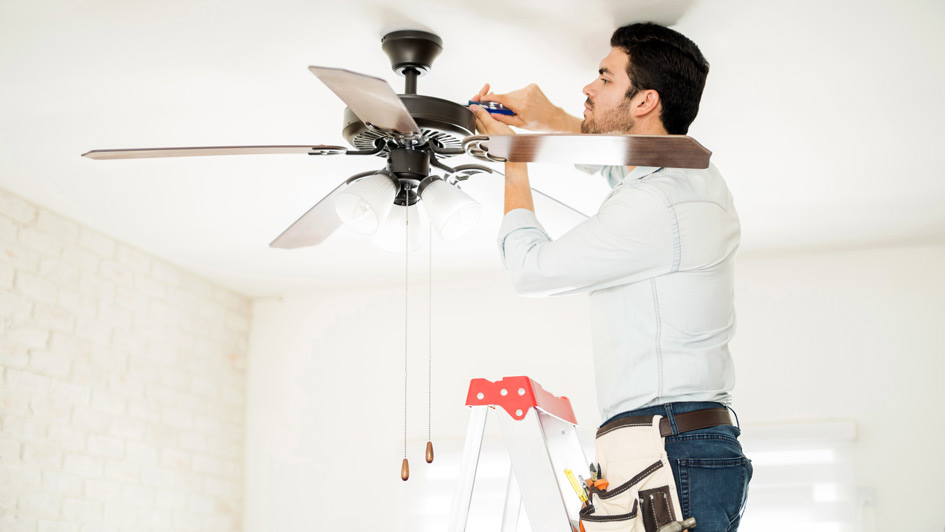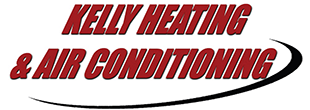
Ceiling fans are one of the most underappreciated ways to increase home comfort and reduce energy costs. By enhancing air circulation and supporting your HVAC system, ceiling fans and energy efficiency are truly a natural pairing. They offer a cost-effective, energy-efficient way to keep cool while lessening strain on your AC—potentially sparing you from unnecessary air conditioning repair.
In this blog, the experts at Kelly Heating & Air Conditioning discuss how ceiling fans can keep you cool while saving you money thanks to increased HVAC efficiency. We'll also offer some HVAC efficiency tips that make the most of ceiling fans.
Comfort vs. Temperature: Getting Comfortable with the Wind-Chill Effect Indoors
Ceiling fans don’t actually lower the room temperature—they cool you down by blowing air across your skin. This is referred to as the wind-chill effect, and it can make a room feel up to 4 degrees cooler without touching the thermostat. That means you stay comfortable and enjoy the benefits of indoor air circulation from your ceiling fan while using less AC—helping reduce your electric bill in summer.
The Best of Both: Advantages of Pairing Fans and Air Conditioning Together
There are several advantages to using ceiling fans and air conditioning in tandem, especially when it's very hot outside. By combining both, you maximize HVAC efficiency and enjoy a cooler living space with less work from your cooling system.
Why you should use ceiling fans and AC together:
- Ceiling fans help lower HVAC load by circulating cool air more evenly throughout the room. Limiting HVAC stress is important, because it can help you avoid a breakdown that may lead to premature AC or furnace installation.
- Using ceiling fans boosts the comfort level of your home by reducing uneven temperatures and increasing airflow.
- Combining ceiling fans and AC can cut energy consumption. If you have a home automation system, you can even fine-tune your smart thermostat settings to increase the temperature slightly while your ceiling fan is running.
Clockwise vs. Counterclockwise Ceiling Fan Rotation: Which is the Correct Direction?
To maximize the benefits of your ceiling fans year-round, it’s important to make sure the blades rotate in the proper direction for the season. The direction affects how air circulates, which can either make you feel cooler or gently recirculate warm air so you feel warmer.
When it's best to spin ceiling fans counterclockwise
When it's hot outside, ceiling fans should rotate counterclockwise at a higher speed. This creates a breeze that pushes cool air downward, enhancing the wind-chill effect and causing you to feel cooler.
When to spin ceiling fans clockwise
On cold days, set your fan to turn clockwise on a slower speed. This softly moves cold air up and circulates heated air down to where you can feel it, making the space feel cozier without changing your thermostat.
What Type of Ceiling Fan Is Best
Choosing the best ceiling fan depends on a few important details, including blade design, airflow rating and room dimensions. First, look for fans that offer a good blend of ECFM airflow and blade pitch to ensure efficient air circulation in your space:
- ECFM is how much air a fan pushes—the cubic feet per minute, or CFM—per watt of electricity used. Fans with greater ECFM are the most energy efficient.
- Blade pitch refers to the angle of the blades. A sharper blade pitch moves more air but can also stress the fan’s motor.
Also, consider room size when sizing a ceiling fan—a fan that’s too small won’t move as much air as you'd like, while one that’s too large may be overpowering for the room.
Boost Your HVAC Efficiency With Help from Kelly Heating & Air Conditioning
At Kelly Heating & Air Conditioning, our HVAC experts can help you stay comfortable while easing the burden on your heating and cooling systems. From efficient ceiling fan strategies and air conditioning installation to smart thermostats and furnace repair, we offer comprehensive solutions that match your needs. Reserve your appointment by calling 319-337-3520 today.





